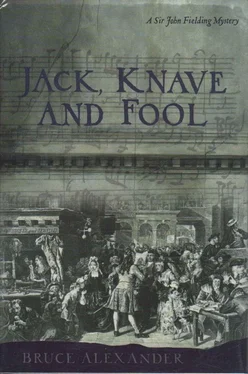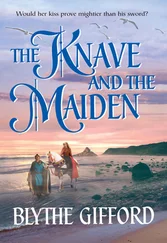Bruce Alexander - Jack, Knave and Fool
Здесь есть возможность читать онлайн «Bruce Alexander - Jack, Knave and Fool» весь текст электронной книги совершенно бесплатно (целиком полную версию без сокращений). В некоторых случаях можно слушать аудио, скачать через торрент в формате fb2 и присутствует краткое содержание. Год выпуска: 1999, ISBN: 1999, Жанр: Исторические приключения, на английском языке. Описание произведения, (предисловие) а так же отзывы посетителей доступны на портале библиотеки ЛибКат.
- Название:Jack, Knave and Fool
- Автор:
- Жанр:
- Год:1999
- ISBN:9780786217984
- Рейтинг книги:4 / 5. Голосов: 1
-
Избранное:Добавить в избранное
- Отзывы:
-
Ваша оценка:
- 80
- 1
- 2
- 3
- 4
- 5
Jack, Knave and Fool: краткое содержание, описание и аннотация
Предлагаем к чтению аннотацию, описание, краткое содержание или предисловие (зависит от того, что написал сам автор книги «Jack, Knave and Fool»). Если вы не нашли необходимую информацию о книге — напишите в комментариях, мы постараемся отыскать её.
Jack, Knave and Fool — читать онлайн бесплатно полную книгу (весь текст) целиком
Ниже представлен текст книги, разбитый по страницам. Система сохранения места последней прочитанной страницы, позволяет с удобством читать онлайн бесплатно книгу «Jack, Knave and Fool», без необходимости каждый раз заново искать на чём Вы остановились. Поставьте закладку, и сможете в любой момент перейти на страницу, на которой закончили чтение.
Интервал:
Закладка:
Finally, Christmas put an end to it. I received a gift from Sir John and Lady Fielding of the four volumes of Sir Edward Coke’s Institutes of the Law of England. This was to be the beginning of my education in the law. I started at once to read through it, using those hours which I had previously devoted to Annie’s lessons. When she protested, I reminded her rather priggishly that I, too, had an ambition, and that mine was as dear to me as hers to her. We argued. She sulked. She attempted to push forward on her own, but would come often to me to ascertain pronunciation or meaning. I would then often become short with her, and again she would sulk and sometimes we would quarrel. So is it often with brother and sister in proper families. So was it early in the year 1771 with our own.
Sir John and Lady Fielding could not but notice that some ill feeling had arisen between Annie and me. He, being the just and gentle ruler I have named him, thought to cheer us and bring peace between us by offering a treat. As it happened, Shakespeare was unavailable (and since he was indirectly the cause of our falling-out, might only have complicated the matter between us), and so Sir John looked elsewhere for our diversion. He turned his attention to the Crown and Anchor. It was then, as it is now, a tavern of great dimension in the Strand; in those days it was the site of the Sunday concerts sponsored by the Academy of Ancient Music under the direct patronage of Lord Laningham. If Shakespeare would not do for us, surely a dose of Handel would serve as well. Annie, who had lately turned snappish and glum, would surely be cheered by the mighty choral strains of that late, great master. We knew her, after all, to be the best musician of us all; as a singer of ballads and old songs learned in Covent Garden she knew no peer.
And so it was set: we would be off to the Crown and Anchor for an early dinner with Mr. Donnelly and Mr. Goldsmith, to be followed by a musical entertainment the equal of any in London. It would be an evening to remember, Sir John assured us. And so it was, reader, though not for reasons that any one of us could have foreseen.
Because of the limited capacity of the Bow Street Court’s strong room, it was necessary for Sir John, as magistrate, to hold a short session on Sunday. Saturday night brought him always a rich harvest of drunks. He dealt with them swiftly so that he and Mr. Marsden, his court clerk, might be on their way to enjoy the rest of the day. This usually meant that he dealt with them leniently. There were sometimes complications, of course. And as I remember, one such arose whilst I sat taking my ease on one of the back benches of the Bow Street Court, listening as the magistrate heard one case after another of public drunkenness. Having had part of the night and all the morning to return to themselves, they were now sober and repentant, though they appeared much the worse for their experience. The last of them, tall and thin and dressed in brown linsey-woolsey — but with a plaid waistcoat in the Scottish style — could not pay the fine often shillings which Sir John imposed, for as he explained, he’d “drunk up” all he had in his pocket. His name he gave as Thomas Roundtree, and he claimed to be gainfully employed as a journeyman carpenter, one of a gang working on improvements to one of the great houses on Bloomsbury Square.
“Which great house is that?” asked Sir John.
“It’s that of the Lord Chief Justice,” said Mr. Roundtree.
“And what sort of improvements are you making?”
“We’re puttin’ in a new water closet, sir, makin’ it nice lor the ladies of the house, we are. I’m a good worker, sir, I am truly”
” Ah, well, I suppose in that case you would prefer not to spend thirty days in the Fleet Prison in lieu of fine. That is customary in this court.”
“No sir, indeed I would not, for I am a workingman and would have no job of work when I came out.”
“You put that quite reasonably, Mr. Roundtree. What, then, do you suggest?”
“Ah, well, I could pay it to you bit by bit, p’rhaps.”
“I have a better idea. Why not remain as our guest here at Bow Street for one more night? Then in the morning you may go to your place of work in the company of one of our constables and ask the master carpenter for whom you work for the loan of the ten shillings. If you are as good a worker as you say, then he should not hesitate to advance it to you. Him you can pay back bit by bit, as you proposed to do with me.”
Thomas Roundtree stood, hesitant, rubbing his chin. “Well, sir …”
“Have you family? ” asked Sir John.
“Nooo,” said he, though he hesitated a bit.
“Then you’ve no one to remark your absence one more night.” Sir John at last became impatient: “Come now, sir, it’s either that or the Fleet Prison.”
“Well, when you puts it so, I accept your invitation. I do hope for a better dinner than I got a breakfast, howsomever.”
“We’ll feed you. That is our obligation.” Sir John slammed down his gavel upon the table. “Mr. Fuller, conduct the prisoner back to the strong room. And Mr. Marsden, are there more?”
“None, sir,” said the clerk of the Bow Street Court.
“Then this Sunday session is done.” He beat down his gavel once more, stood, and stretched. “I’m for a nap before dinner,” he declared. “It will be a long evening ahead, and I wish to be fit for it.”
Fit for it we were and dressed for the occasion as we set off by foot for the Crown and Anchor a little before five. It being January, the day was all but gone; sunset had gone to twilight and twilight to dusk. But the lamplighter had been out upon his rounds, and our way — Russell Street to Drury Lane, Drury Lane to the Strand-was well lit and filled with London folk enjoying the last of their day of rest. Sir John, well refreshed by his afternoon nap, led the way with Lady Fielding upon his arm. As long as he was here in the Covent Garden district that he knew so well, there was little chance that he would make a misstep, but should he perchance do so, his good wife was there to put him back on course. Annie and I followed at a near distance.
“What of this Handel music we go now to hear, Jeremy? What do you think of it?” Annie asked her question as we marched along Russell Street.
“Well,” said I, “from what I’ve heard, I think it quite fine. Gives you a sense of the grandness of nature, it does. Raises your spirits.”
“All that? To me it just seems terrible loud. I can’t make out the words.”
“Sir John certainly loves his Handel,” I said, making a mild reproof of a neutral comment.
“Oh, indeed he does. Me, I like a good ballad, a street song.”
“You know them all.”
“I know many,” she agreed. Then, with a sigh: “Still, be it good or foul, I look forward to eating any meal cooked by another. Sir John and the good lady wish us to be well entertained this evening, and I, for one, am determined to be so.”
So saying, she lapsed into a silence which lasted until the hanging sign of the Crown and Anchor was in sight. There was, in any case, no mistaking our destination. Closed carriages, coaches, and hackneys crowded the entrance of the place, discharging their passengers, ladies and gentlemen, onto the walkway. There was a bustle of excitement to the scene before us which seemed to bespeak our entrance into the great life of our great city.
“Oh, Jeremy,” said Annie beside me, “this is indeed exciting. Just look at them all, how fine they are dressed! How they seem to glide, like they was walking on air, you might say. Damn me, but I must work on my walk if I’m to look the part of a lady.”
“Onyour speech, as well,” said I. “Ladies don’t say ‘damn.’”
She stopped and turned upon me, looking as if she was about to give me a sharp retort. But then she softened and said most seriously: “Right you are to correct me. I know I speak like a slut more often than not. I must learn better. I will learn better.”
Читать дальшеИнтервал:
Закладка:
Похожие книги на «Jack, Knave and Fool»
Представляем Вашему вниманию похожие книги на «Jack, Knave and Fool» списком для выбора. Мы отобрали схожую по названию и смыслу литературу в надежде предоставить читателям больше вариантов отыскать новые, интересные, ещё непрочитанные произведения.
Обсуждение, отзывы о книге «Jack, Knave and Fool» и просто собственные мнения читателей. Оставьте ваши комментарии, напишите, что Вы думаете о произведении, его смысле или главных героях. Укажите что конкретно понравилось, а что нет, и почему Вы так считаете.












